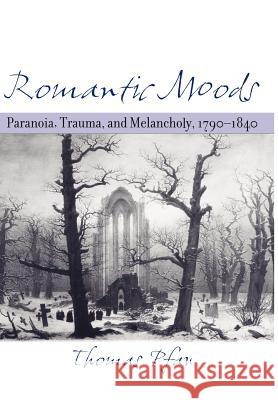Romantic Moods: Paranoia, Trauma, and Melancholy, 1790-1840 » książka
Romantic Moods: Paranoia, Trauma, and Melancholy, 1790-1840
ISBN-13: 9780801881978 / Angielski / Twarda / 2005 / 592 str.
Thomas Pfau reinterprets the evolution of British and German Romanticism as a progress through three successive dominant moods, each manifested in the "voice" of an historical moment. Drawing on a multifaceted philosophical tradition ranging from Kant to Hegel to Heidegger--incorporating as well the psychosocial analyses of Freud, Benjamin, and Adorno--Pfau develops a new understanding of the Romantic writer's voice as the formal encryption of a complex cultural condition.Pfau focuses on three specific paradigms of emotive experience: paranoia, trauma, and melancholy. Along the trajectory of Romantic thought paranoia characterizes the disintegration of traditional models of causation and representation during the French Revolution; trauma, the radical political, cultural, and economic restructuring of Central Europe in the Napoleonic era; and melancholy, the dominant post-traumatic condition of stalled, post-Napoleonic history both in England and on the continent. Romantic Moods positions emotion as a "climate of history" to be interpretively recovered from the discursive and imaginative writing in which it is objectively embodied. Pfau's ambitious study traces the evolution of Romantic interiority by exploring the deep-seated reverberations of historical change as they become legible in new discursive and conceptual strategies and in the evolving formal-aesthetic construction and reception of Romantic literature. In establishing this relationship between mood and voice, Pfau moves away from the conventional understanding of emotion as something "owned" or exclusively attributable to the individual and toward a theory of mood as fundamentally intersubjective and deserving of broader consideration in the study of Romanticism.











